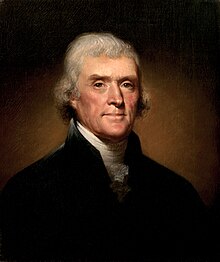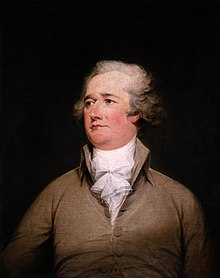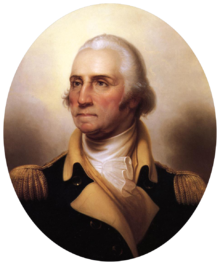Patriots (american independence)
Patriots was the self-designation of the settlers of the British Thirteen Colonies in North America who rose against the Crown during the American Revolution .
Its leaders declared American independence and thus founded the United States of America . The Patriots were influenced by John Locke and the American Enlightenment , as well as the political philosophy of American republicanism formulated by Thomas Jefferson , Alexander Hamilton and Thomas Paine . As a group, the patriots encompassed a wide range of political views and social positions, from conservative federalists like Alexander Hamilton to aristocratic plantation owners like Thomas Jefferson to social revolutionaries and lower class farmers like Daniel Shays and Joseph Plumb Martin . Her opponents among her fellow colonists were the loyalists loyal to the British Crown. Many patriots were already before the outbreak of the American Revolutionary War active, such as the Sons of Liberty ( Sons of Liberty ). The most prominent leaders of the Patriots are revered by Americans to this day as the Founding Fathers of the United States .
Use before 1760
The term "patriot" was also used by American settlers in the pre-war period, referring to the American Patriot Party . Members of this party referred to themselves as "Whigs" after 1768 to express their solidarity with the members of the British Whig Party , who harbored similar ideas about colonial politics.
Political goals
The individual patriots came from very different social classes. Among the most active of the members were above all highly educated and wealthy men, whose struggle for independence would, however, have failed without the support of the lower classes. These included, for example, lawyers, farmers, dressmakers, mechanics, shoemakers and preachers. The lower and middle classes of society were extremely unhappy with their financial situation, which was adversely affected by the collection of British taxes. In their view, the taxes were wrongly collected because the American colonists were not represented in parliament. This coined the motto "No Taxation without Representation" - No taxation without representation.
The people in the colonies of New England were particularly affected by British taxation , as they were largely dependent on trade and the colonial economy was built on it. The patriots declared themselves loyal to the crown in principle, but believed that the colonies should govern themselves. Indeed, after a period of neglect by the Crown in the run-up to the French and Indian Wars, the colonies were largely self- governing . The British, on the other hand, took the view of virtual representation, that is, they assumed that parliament represented all citizens of the empire. The conflict led to rebellion against renewed taxation and sparked the War of Independence.
distribution
Many historians assume that no more than two-fifths of all colonists openly committed to the revolution. There are two central theories about the political composition of the colonial population, one is based on a tripartite division, in which one third belonged to the patriots and one to the loyalists, while a third was neutral. The other theory estimates the proportion of patriots at 35 to 40 percent, the neutral population at 30 to 35 percent and that of the loyalists at 25 to 30 percent.
Prominent patriots
Politician
Writers and activists
- Samuel Adams
- William Dawes
- Alexander Hamilton
- William Molineux
- Timothy Matlack
- Thomas Paine
- Samuel Prescott
- Paul Revere
Military leaders
- Nathanael Greene
- Nathan Hale
- Francis Marion
- Andrew Pickens
- Daniel Morgan
- James Mitchell Varnum
- Joseph Bradley Varnum
- George Washington
literature
- Joseph J. Ellis: They made America. The founding generation from John Adams to George Washington. CH Beck, Munich 2005, ISBN 3-406-52829-5 ( Beck'sche series 1655).
- Robert Middlekauff: The Glorious Cause. The American Revolution, 1763-1789. 2nd edition, revised and expanded. Oxford University Press, New York NY 2005, ISBN 0-19-516247-1 ( The Oxford History of the United States. Vol. 3).
- Ray Raphael: A People's History of the American Revolution. How Common People Shaped the Fight for Independence. Perennial / HarperCollins, New York NY 2002, ISBN 0-06-000440-1 .
- Cokie Roberts: Founding Mothers. The Women Who Raised Our Nation. William Morrow, New York NY 2004, ISBN 0-06-009025-1 .
Individual evidence
- ↑ Stuart Murray: Smithsonian Q & A: The American Revolution , HarperCollins Publishers by Hydra Publishing (in collaboration with the Smithsonian Institute ), New York, 2006, p. 31.


